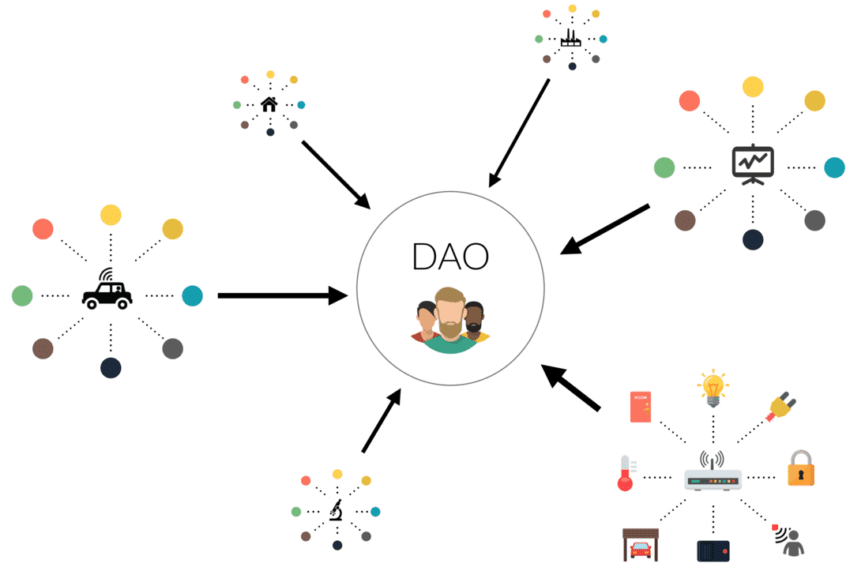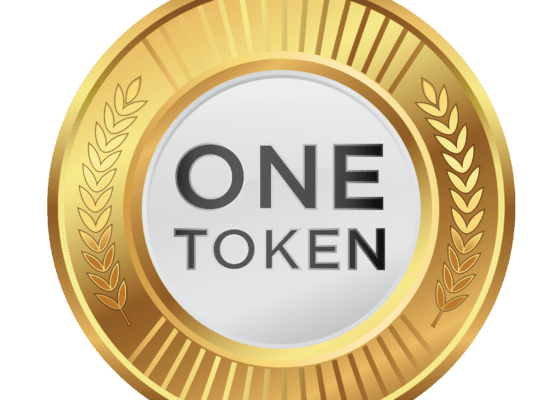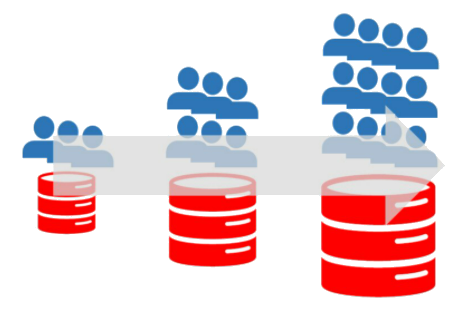One of the most innovative applications of the blockchain technology are the Decentralized Autonomous Organizations (DAO). These organizations are something similar to communities where Smart Contracts define how they work. In these contracts the protocol defines all the conditions so the community can work independently. This imply that there is no need for external intervention or public surveillance to be managed. In this post, we explain everything about DAOs and the applications they may have in the future.
What is a DAO?
Therefore, the DAOs are organizations which work autonomously thanks to the code in their smart contracts. In them is where the rules are defined, and all the user have vote to change them. These organizations are, in fact, decentralized, removing the hierarchies existent in other organizations. Furthermore, these organizations have coordination thanks to the consensus protocol, which applies to all the users. This is quite similar to Bitcoin, which is, in fact, the first fully functional DAO.
If we think about it, Bitcoin works with absolute independence, it has very concrete rules about issuance and mining, it is open source (so anyone can access the code) and it is fully decentralized. However, the concept of smart contract did not appear until some years later with Ethereum. This is the reason why the community does not consider Bitcoin as a truly DAO in comparison with other organizations.
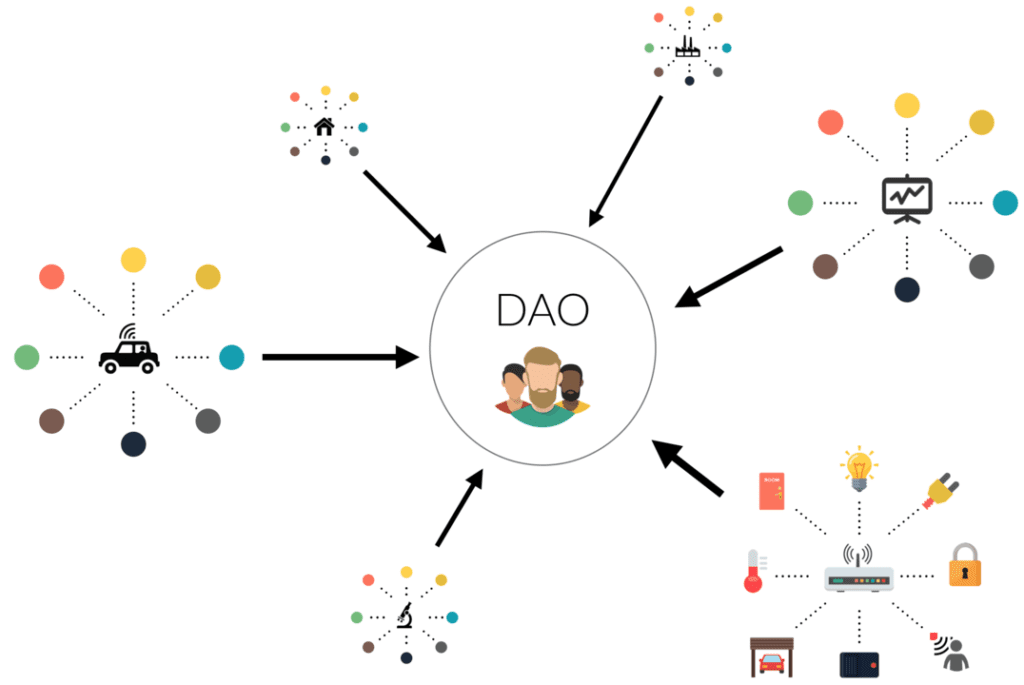
In order to sum up, we need several elements to consider any network a fully functional DAO. These elements are:
Basic elements of a DAO
- Smart Contracts – the smart contracts are lines of programming code where you can define anything you about how the platform should work. In these contracts you can define clauses of several types, for example: [if ‘a’, then ‘b’]. These contracts sometimes need an external connection to receive information about the fulfillment of the triggering clause. This connection is usually called the “oracle”.
- Exchange token – the nature of the DAO is being a decentralized organization built in a blockchain platform. Due to this, the DAO needs a token to perform any transaction. Most of the times this token will be a cryptocurrency. In fact, Ethereum was specifically designed to deploy these kind of organizations, where the Ether should work as the exchange token.
- Consensus algorithm – as in any other decentralized platform, it is necessary to have a consensus algorithm to reach any agreement among the participants. The safer this algorithm is, the more difficult will be to hack the DAO.
- Blockchain – last but not least, every organization which is decentralized and which works with smart contracts must be deployed in a blockchain. This blockchain will serve to store the transactions and to make available all the information, including the smart contracts.
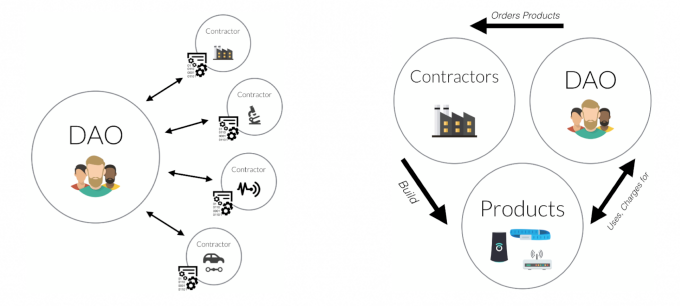
Given all the previous elements, we can see that the DAOs are built through the most basic elements of any DLT network. They have a decentralized network (usually blockchain) to store the transactions, they use a consensus algorithm for the decisions making process, they use an exchange token (cryptocurrencies) and they work thanks to smart contracts. Additionally, they are quite transparent and do not have any established hierarchy. From all this information we can now extract the pros and cons of these organizations:
Pros and cons of a DAO
As we have seen, the DAOs have several advantages thanks to their decentralized conception but also disadvantages due to their flexibility. Let’s see first the strengths of these organizations:
- They are organizations able to manage themselves. This means that they do not have any dependency of any external party but their own protocols and rules.
- These rules are available in public Smart Contracts and accessible to all the participants. Therefore, the DAOs are transparent for anyone.
- Additionally, these organizations lack of any kind of hierarchy, which means that all the participants have the same rights and obligations. Because of this, we can assert that the DAOs have a very democratic and decentralized structure.
- The absence of rules apart from the Smart Contracts allow a great flexibility. In fact, the more complex the Smart Contracts are, the more flexible and the better performance the DAO will have.
However, it is precisely this flexibility the origin of some challenges of these organizations:
- There is a huge dependency on the Smart Contracts. The design of these contracts is not easy and given the importance of these programs, any mistake could become fatal for the organization. In fact, these mistakes could generate the loss of the tokens by the issuers, incoherence in the decisions making process, etc.
- Additionally, the protocol of the DAOs must be compliant with the external regulation. In the current moment, when most of the countries have no specific regulation for these organizations, the compliance is not simple.
- Last but not least, it is important to have in mind the early stage of development of these organizations, which generates a lack of general acceptance. The community in the cryptocurrencies industry may be very enthusiastic with the DAOs, but that is not the case in other sectors.
Applications of DAOs
At first sight, the use cases for DAOs could be as different as the Smart Contracts in their protocol. However, it is true that most of the existing DAOs are very related to crytocurrencies services. This means that the most conventional sectors have not tested their flexibility. Most of the projects are, in fact, working in the cryptoassets industry, where they are most accepted.
Despite of this, the potential of the DAOs is much bigger according to their structure. The DAOs are a new way for any group of people for collecting money and supporting any project. This project has, in fact, a very clear set of rules which everyone knows and must follow. Thanks to that, the use cases are so different.
Nowadays, for example, we can find the “social DAOs”. These organizations work as private clubs where you can pay some fee to access a set of services or activities. There has been also some cases of DAOs which work as crowdfunding to obtain the money to acquire any collectible product for example. It is not always clear in these cases that the DAOs structure can be better than the traditional organization, but this is where the industry is going now, at list in a first phase.
Examples of DAOs
Once we have seen what a DAO is and what the main use cases are, we can analyze the most popular example of these organizations. The name of it was “The DAO” and it was deployed in 2016 as a venture capital fund. Lots of people around the world invested their money to get benefits from the services this DAO offered. It finally collected more than $150 millions.
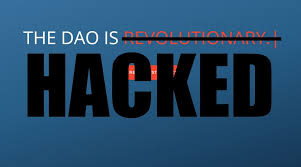
One month after its conception, someone discovered a mistake in the code of the Smarts Contracts. The hacker deviated one third part of all the $150 millions out of the DAO, and the company could not afford the looses and it finally closed. This situation had a huge impact in Ethereum, which was the platform where the DAO was launched. In fact, Ethereum decided to create a new platform to protect all the victims of the fraud. It was the birth of Ethereum Classic. The author of the hack is still unknown.
Obviously, not all the cases had the same ending. There are some other examples of DAOs with great success, as “Friends with Benefits“. This organization allow its members to participate in private events of cryptocurrencies, and it also offers some other benefits. In other case, like “PleasrDao“, the main goal is to collect money to acquire art pieces as well as other collectibles. With a DAO structure, the users can decide what to do with the ownership of these pieces.
There are some other examples of DAOs as Dash, and open source cryptocurrency, Digix Global or BitShares. However, most of them are very related to the trading of cryptocurrencies. Therefore, there is not so many use cases for conventional businesses.
Challenges for the future
Due to cases like “The DAO”, the cryptocurrencies community had to face a problem that is still unsolved: should a blockchain network infringe its immutability to protect the investors in case of external attacks? Ethically we know that the network should protect all its investors. However, from a theoretical point of view, the immutability of the transactions is one of the basic elements of any blockchain network. If we reject this element, we will be rejecting a big part of the essence of the blockchain technology.
Regarding the generic DAOs, we have seen that, thanks to their characteristics, they have a great potential. Their structure allows representation of organizations of almost any type (at least in theory). However, the lack of a common regulation and the complexity in building the proper Smart Contracts are the reasons for such a small number of these kind of organizations.
With the launch of initiatives as MiCA in Europe, the DAOs count with a universal legal framework to support them. This can serve to increase the number of projects and to facilitate the legal coverage for the Smart Contracts. If we add a higher acceptance from the general public, we will probably observe a significant growth of DAOs in the following years.

